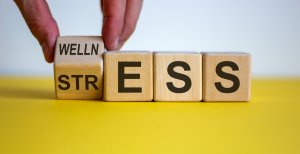Steps to Reduce Stress-Related Drinking
Homer Simpson, patriarch, life philosopher and animated character on the longest-running American TV series The Simpsons has a lot to say about a lot of things. Take this toast he makes. “To alcohol! The cause and solution to all of life’s problems.” It has been described as “one of the best, most truthful Simpsons statements ever.” A la Homer Simpson, think about how people say “I need a drink.” It’s as if having a swig or two or more is the go-to for dealing with a difficult situation. Many turn to alcohol to relieve stress.
But is alcohol truly a coping mechanism for stress? It may provide a temporary cushion, but how about over the long haul? What effect has the pandemic had on these issues? And what are ways to lessen drinking attributed to stress?
Stress and Drinking
Stress may be triggered by various things. Some may seem to be positive, such as buying a home, beginning a job, receiving a promotion at work, getting married. They’re all about change, as are experiencing the death of a loved one, losing a job, ending a relationship. These and so many other events and factors may generate stress.
Some choose to alleviate distress through drinking alcohol. This choice may be a quick fix. It may quell anxieties and vanquish uneasy pangs in the moment. The National Institute on Alcohol Abuse and Alcoholism (NIH) offers a more forward-looking view. “Problems arise… when stress is ongoing and people continue to try and deal with its effects by drinking alcohol. Instead of ‘calming your nerves,’ long-term, heavy drinking can actually work against you, leading to a host of medical and psychological problems and increasing the risk or alcohol dependence.”
Over time, drinking alcohol to relieve stress ends up making the stress worse. Drinkaware explains that alcohol is a depressant. As such, it “disrupts the delicate balance of chemicals and processes in your brain, affecting your thoughts, feelings and actions – and sometimes your long-term mental health.” Upsetting this equilibrium comes with consequences. It “can interfere with what the brain needs for good mental health as well as disrupt our sleep, making stress harder to deal with.”
‘Quiet Stress’ and Drinking during the Pandemic
There’s no doubt about it — the pandemic has caused havoc in our lives. Even as recovery is afoot, ill effects linger. High unemployment exists. The same applies to social isolation and a general upending of our routines. It’s not easy to get back on track from this ongoing, catastrophic event. People are contending with these matters the best they can, often keeping feelings suppressed and to themselves. This is “quiet stress” and, as American Addiction Centers (AAC) points out, “it can contribute to a range of different illnesses, such as addiction, lowered immunity and heart disease.”
How prevalent is “quiet stress” at this time? In a recent survey of 3,000 adults across the U.S. posted by AAC, 48%, almost half of responders, suffer from quiet stress. This affliction can manifest itself in numerous ways. Drinking alcohol is one. As proof, about 19% of participants, or almost one in five, said they are more apt to drink alcohol now to manage stress than before the pandemic.
Other sources agree. “Excessive Drinking Rose During the Pandemic” notes: “The widespread fear, frustration and social isolation surrounding the tumultuous events of the past year – the pandemic, civil unrest, political upheaval – caused stress levels to skyrocket, with many people increasing their alcohol intake.” Women as well as parents of young children have been “hit particularly hard.” What are other findings? “One in four adults reported drinking more this past year to manage their stress.”
How to Pare Back Stress-Related Drinking
What to do? Here are some steps suggested in the article referenced directly above to reduce stress-related drinking. They include:
- “Try Precommitment” – shrink drinking by the numbers and abide by it. Create a plan to diminish consumption on a gradual basis. Lay it all out and follow. Even write it on a calendar and record the results. “Studies show that precommitment is an effective way to change behavior.”
- Build a Social System – don’t go it alone. Enlist family and friends to keep you honest in your efforts to manage stress and slash alcohol use. Get active – walk with them, play sports and participate in healthy pursuits.
- Erect Barriers – establish rules to keep drinking to a minimum. “Time” drinks for a set duration, e.g., make a glass of wine last one hour. Alternate – after each alcoholic drink, imbibe a tall glass of water.
- Swap and Switch – start a new healthier habit by substituting a nonalcoholic beverage for an alcoholic one. Try herbal tea in an appealing flavor or a juice blend. Use this opportunity to explore nonalcoholic beer.
More ideas aimed at lowering stress which, in turn, may cut stress-related drinking include:
- Practice Meditation and Mindfulness – this route not only decreases stress, but also does the same for anxiety, pain and depression. What’s more, it soothes feelings that otherwise may lead to cravings.
- Engage in Peer Support – Join 12-Step meetings to share experiences and draw upon others in similar situations. It’s a solution for social isolation and instills accountability, commitment and motivation.
Are you a victim of stress-related drinking? Don’t struggle on your own. American Addiction Centers can help. Find out more here.
